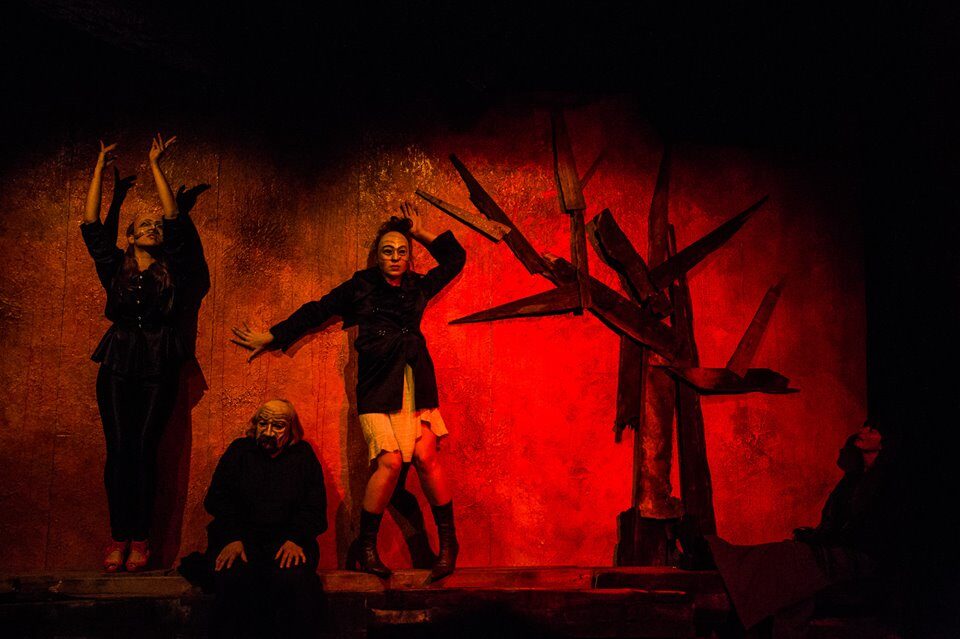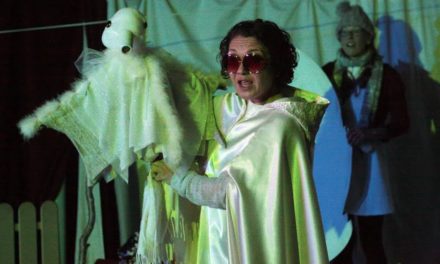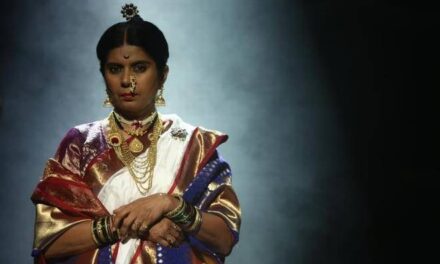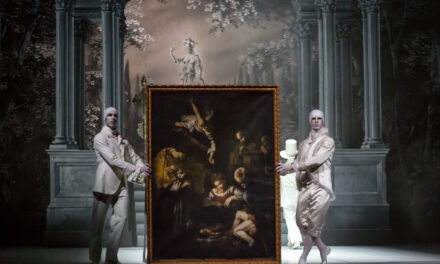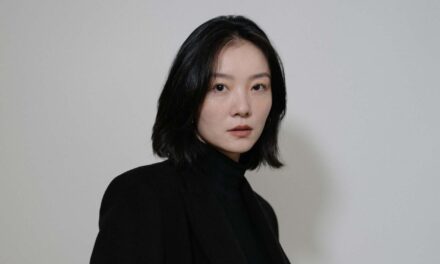The Opening dialogue of the Between.Pomiędzy Festival. 5 May 2020.
Octavian Saiu: I’d like to say welcome, everybody, before anything else. My name is Octavian Saiu and I teach theatre studies and comparative literature, but I’m also a professional theatre critic, and in this capacity, I have been very generously invited by Tomasz Wiśniewski to be, at the same time, an observer and a part of this unique cultural experience that is called Between. And it is a special privilege for me to be – for want of a better word – “chairing” this dialogue which is going to be very informal and I hope very enjoyable. It is, more or less, a discussion about culture, about theatre, about hope under these terrible circumstances that we all facing. But it is also, I think, a testament to friendship and to what friendship can do, creating a positive vibe and channeling some energies towards great cultural endeavors. I’m not going to introduce people, because I think everybody who is going to read its transcript, already knows who the guests are. I’d like to say something before I actually begin the dialogue as such – very, very briefly – about what I perceive to be the creative specificity of Between, as an event and also as a cultural phenomenon.
I’ve been fortunate enough to visit, and actually work with different festivals around the world from the great Edinburgh International Festival to Sibiu International Festival in Romania, from some North American events of this sort to some in the Far East, and I can say without hesitation that I have not come across anything quite like Between. It is a way of thinking about culture that accounts for its very, very special atmosphere and it’s a sense of shared affinities that brings people together there. It is not a large festival; it is not a festival that aims to “conquer” the town in which it happens. It is rather one of those opportunities for people to be together simply because they believe in the same values, they have the same aspirations, and they above all, share the same inspirations. I think this ability that Tomasz Wiśniewski has to bring people together, to be a catalyst for all these energies is an extraordinary one, and I think it should be commended.
Now, the online edition is a test for Between as much as it is a test for all of us. How will that creativity translate from something really, unequivocally concentrated in one place and in a series of small tiny venues into something that involves virtually unlimited participation? I’d like to begin with this question for Tomasz. It is a great proof of courage, I think, that you have decided together with Katarzyna and David to do it online. What are the main risks and what do you think will be the major benefits?
Tomasz Wiśniewski: Thank you very much, Octavian, for this introduction. Initially, we decided to postpone the festival until autumn 2020. We didn’t want to take the risk and we needed to face the reality as it was. We perceived major risks as connected with the disintegration of certain values, losing the character of the festival in the form you described. At one point, however, we began to perceive the lockdown as an opportunity given to us to integrate the artistic and cultural community of our region. We live in Sopot which is a part of Three Cities, of a conglomeration consisting of Sopot, Gdynia, and Gdańsk. We all work at universities from Poland; we are a part of the celebrations of the 50th anniversary of creating the University of Gdańsk; so we thought this is a real test for us to see whether we can be part of a creative force that is happening now, at this moment of lockdown and at the same time we thought about the ways in which the role of our festival may slightly change to also support local culture.
Octavian Saiu: I think that is a very important point to be made. There is a deep connection between the local and the global, and there is almost a redefining process of the public sphere within which the festival operates. At a very practical level, I think Katarzyna has been a decisive and essential element in the entire constellation of energies and symbols that lie at the very heart of the festival. I’d like to ask her how she personally perceives this transition from something that is real to something that will be a virtual, mediated, non-immediate experience.
Katarzyna Kręglewska: This is very difficult, because of the way that I perceive Between.Pomiędzy, the festival that I joined 5 years ago when it was already something going on really well. The most important part of a festival is the encounter, the chance to meet between people, and this is something that we are deprived of at the moment. But I think that we have to redefine encounters and the way that people meet. The strongest point of the festival was for me to make some people meet that wouldn’t have a chance to meet in other circumstances; so the festival provided us with a space to meet those, for example, a professor of quantum physics with an independent performer engaged in experimental art, and we would like to succeed doing that in the virtual world. We have a plan of three main paths that could be followed by our viewers, and what might be a strong point this year is that each member of the audience can project his or her own way of taking part in our festival.
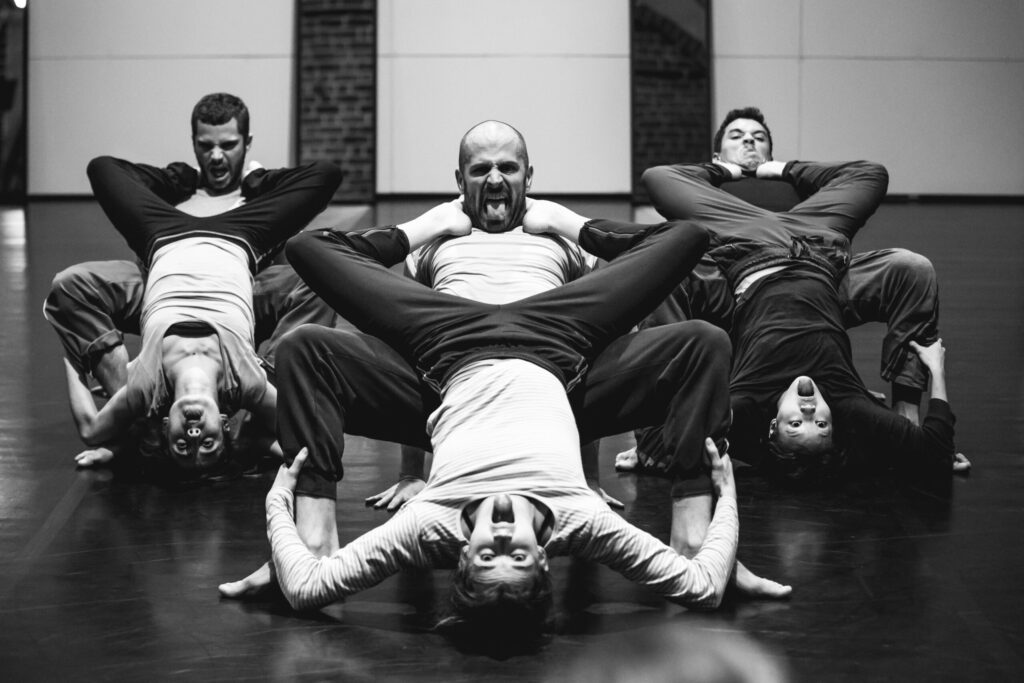
Wyspa. Directed by Grzegorz Bral. Pieśń Kozła/Song of the Goat. Photo by Mateusz Bral.
Octavian Saiu: I was very pleased I wasn’t asked to formally introduce the participants in this dialogue, because it would be very difficult for me to enumerate all the different components of David’s activity – he is a writer, a teacher, he is also somebody who translates a lot of literature, but I would like for the purpose of this conversation to say that he is a “connecter”, somebody who facilitates dialogue and cultural communication across and beyond all sorts of borders. He really is a European citizen, and the fact that he is based now, I think, for most of the time in Sopot, in Poland, contributes to this tremendous openness that he has. I’d like to ask him about his personal and intellectual involvement in the festival, but also about his own relationship with this huge challenge that we all are going to very soon come up against, that of meeting in a virtual space which is infinite, but is also very restrictive.
David Malcolm: Well, I think I should probably die now because nobody is ever going to say anything quite nice as you have about me ever again. So thank you very much, Octavian. I do actually have to in all modesty say that the heavy lifting, as they say, and the conceptual planning of this whole enterprise and our enterprises in the past several years, that’s really done by Tomek and by Katarzyna and by the team. This doesn’t happen otherwise. They shove me out the front of the stage, tell me to introduce stuff and, you know, I’ve never known stage frights so I get to do that. It’s very nice of you to say those things.
I enormously believe in Europe and in Europe in the world as part of the world. Since I was a little kid I actually think I believed that. This is a wonderful opportunity to enact what I believe. The advantage of this idea of doing a virtual festival, the potential, is huge, especially with the title Kosmopolis. We reach out from a small town on the bay of Gdańsk on the Baltic, and we go everywhere. That is a fantastic possibility. However, I am worried. I now have an opportunity – we can cut this in the written version – I now have an opportunity to lay down a line lying that I would not like finally to cross. We have not talked about this, so you are getting this fresh. I love live audiences and I think there is nothing better than working with a live audience. You learn stuff, you adapt, you change. I would never want to stop working with people in theatres, in rooms, in groups, to have actual contact with people. And I really hope that circumstances will allow us to do that sooner rather than later, whatever that means. So that’s my attempted answer to your question. This has great potential. I hope that it’s not the only way. Although, you know, we may get even bigger audiences.
Octavian Saiu: I think your answer really contains all the major dimensions of this enterprise, however defined, because you are absolutely right: the great advantage is that of reaching out to as many people as possible. The major disadvantage, however, is that we cannot really be in a shared space, at the same time. And this, I think, will shape the very theme of the event in an unpredictable way. I would like to introduce this notion of cosmopolitan identity and of “cosmopolis”, which is at the same time a real and a virtual proposition. And I’d like to ask Tomasz about this initiative particularly. Because the festival that you have been curating and into which you’ve brought people like David and Katarzyna, has that cosmopolitan flair, but at the same time it is grounded, anchored in the perimeter of a community.
I was recently engaged in a different kind of dialogue with people who are currently contemplating the future of European festivals. And somebody – somebody representing Brussels, EU, no less – said something that really, really, stuck to my mind. He said, maybe from this day onwards we will have to ask one another not “where are you from?” or “where do you come from?”, in the sense of that very vague perception of identity. But rather, “what city do you live in?”, because the city has become an index of individual identity that is based on choices and assumed decisions. The city we live in is a matrix of self-identification. It is also the place where all these different tendencies, these different trends and ideas collide. That’s why a great festival city is also a cosmopolitan city. So I wanted to ask you, Tomasz, about the theme, about what motivated you, what inspired you to choose it, but also about the way in which you think it will be inevitably transformed by the current setting of the festival.
Tomasz Wiśniewski: This is a very important issue for us from the very beginning of Between.Pomiędzy, even when it was not called Between.Pomiędzy. We were quite aware of our identity in terms of towns, in terms of cities. David and I live in Sopot and this is our choice. We were not born there, but we are deeply rooted in the city structure, in the city tissue. It is like we really feel that this is one of few places where… well I should be speaking for myself… where really the local identity and cosmopolitan identity go together. Well, this is a resort which means that we’ve got lots of tourists, which means we’ve got many people from different countries who come to Sopot and who spend their time in this place. At the same time, we’re in a very interesting situation, because Sopot is part of a larger community, of the Tricity, of three independent towns, which form together with a conglomeration, where you really live in one place and work, as I do, at the University of Gdańsk in Gdańsk, and I get to my job within ten minutes, to a different town. I find this is particularly interesting, because it allows you to have a slightly different identity, it allows you to have a broader view of where you are from. Because I am at the same time from Sopot and I feel I am also from the Tricity – Trójmiasto as we call it in Polish. At the same time, we know the story of Gdańsk as not only being very important in the distant past but also in the recent past, in the 80s, the beginning of the 80s, with the Solidarity movement. So I think its cosmopolitan character is here by definition. We feel that this is one of the places in Europe, in the world, which is in a sense recognizable and the cultural position on the map of Europe of the Tricity, of Gdańsk, of Sopot, of Gdynia, is quite strong.
When answering your question as precisely as I can, I would like to say yes, I feel a strong necessity for identifying with cities, with small communities where we live, and at the same time taking into consideration the global experience. Surprisingly we selected this topic a year, nearly a year ago. Kosmopolis today means something different than two months ago, okay? When I was in London in the theatre just before the lockdown, I was in a different world. I have to admit, I was in a different era I think and I feel we will need to redefine what it means from this perspective, but also the perspective of the local community to which we feel strongly we belong.
Octavian Saiu: I think it’s totally fair of you to claim that. Because, indeed, I have been to Sopot more than once, and I have really sensed that deep connection between the festival and the community, although it is not explicit, it is not explosive as in the case of Sibiu or Edinburgh, because of the scale, the size of this event, but also because of a certain way of framing it which is based on a very different concept. And I think that concept is going to become more and more valuable as we go on because it is based on selective affinities, it is based on common interests, on something that really, really brings people together, because they believe in it. Both David and Katarzyna are translators, and I remember what Umberto Eco once said, not long before he died: “the language of Europe is the language of translation.” That in itself puts things in a kind of multicultural, transnational, cosmopolitan perspective. So I’d like to invite you to share some views on the theme that we are all going to engage with, in the context of this year’s edition of Between.
Katarzyna Kręglewska: David, you are sure you don’t want to say anything at the beginning?
David Malcolm: I want you to do the difficult stuff in answering the question. Then I come along to do the easiest stuff.
Octavian Saiu: It’s not a question as such, it’s something that I’d like you to elaborate on. This idea that today the language of Europe is the language of translation, and also that festivals are events that favour and stimulate the translatability of culture. We think that theatre is a local phenomenon, and for all intents and purposes it is, but at the same time, it is an experience that can be appreciated and enjoyed by people from other parts of the world, thanks to some festivals that facilitate this constant interchange of cultural values. So I want you to share some thoughts on this very idea of a cosmopolitan festival, which is grounded in a Polish tradition but is at the same time an international event in the best possible way.
Katarzyna Kręglewska: I would like to begin again with this situation of encounter. If we want to gain something from the meeting of people from various cultures, various places, different cities, and different places over the world, we need to find some common language. Of course, it is very difficult. We usually cooperate with David while working on translations, both ways from Polish to English and from English to Polish, and the situation is really different. I like that work a lot because I can see how different the way we perceive things is, I mean David and I. And it’s something that we can acknowledge only while working with language and trying to interpret something, so in my opinion, this is one important thing. Of course, there is always a risk when we want to make something very cosmopolitan that you lose some of the values and specific elements of each culture because you need to find a common ground, you need to make some simplifications, it’s inevitable, you have to do that. But the way I see it, we have to find a way to leave what is specific and what is characteristic for those small communities, small cultures. And to make it understandable for people from different places, because I think that the situation of the lockdown and the situation with COVID is something that proves that we actually have to face the same difficulties. The situation is very, very similar for each and every one of us at the moment. Just some of the decorations and the scenery are different, the situation is the same, we all have to work online and try not to go mad. And that’s it.
Octavian Saiu: You know, the very word that you insisted upon – if I may for one second, David, just accentuate this, because it really captures the transnational, cosmopolitan ethos that I was talking about – is ‘encounter’. Of course, it’s an English word that we can all use, and it can mean a variety of things at the same time for different people, in different parts of the world. For me personally, it is inevitably linked with the legacy of Jerzy Grotowski. In the 1960s in Wrocław, he said something extraordinary, and I think that is still the most beautiful and the most poetic definition of theatre. He said: “Theatre is the encounter between somebody who watches and somebody who performs. That’s all you need to have.” A word that may seem innocent and devoid of any particular, cultural underpinning, for me represents something that is deeply Polish. So I want to invite David to say a few words, but before, I’d like to ask him, what is his language these days, in that spiritual, complex sense?
David Malcolm: George Steiner famously says that you know what language you speak when you’re involved in a car crash and you shout out something. Although when he was involved in a car crash, he couldn’t actually remember. He said something, but neither he nor his wife could actually remember what it was and in what language. I think if Steiner says that, you know… I don’t know what to say, Octavian. I actually don’t think anybody has one language. Sorry, I don’t know if it is off the subject. Maybe it’s not, because it’s cosmopolitan. I don’t think anybody has one language. Language has to do with encounters, and it has to do with situations. I’m Scottish, I have been accused by my wife, of engaging linguistic hypocrisy when I go to Scotland. She says it with an ironic twinkle in her eye because I move, and it depends on the situation, how Scottish do I need to be. I think that languages are always a continuum. Obviously I’m happier, I’m more at ease in English than in any other, but if the circumstances demand, I find you switch to another tongue another discourse within that tongue. I think one of the sadnesses for many English speakers is that they don’t do this. I’m sure, at my age, when I say that, the English-speaking world has to some extent become monolingual and that is very sad.
If we could connect with the Between.Pomiędzy… “Between” has always been – Tomek invented it, and the full stop between “between” and “pomiędzy,” which he assures me, for reasons I’ve never actually fully been able to understand, he assures me that full stop, which is not properly spaced, is supremely important. I obviously have an intuition of what’s going on. But we’ve always been to some extent about the encounter, which of course is an English word, but it’s an English word taken from French. From a romance language. It is about a precise encounter; I think the ‘encounter’ is there in the title.
I endorse everything that Katarzyna says and translation is a messy business, it is a compromised business, but it is absolutely essential. I’m very proud that we are able to work in terms of translation literary and translation metaphorically in many ways in the festival. The great advantage of, I think, this virtual festival, one of the great advantages, is the fact that Tomek and I found out, very early on, when the festival started, we were exhausted by day two because both of us went to everything. What we worked out, duh, brilliantly at a certain point is that we don’t have to be… All of us don’t have to be at everything. With Katarzyna, we worked out that principle, that as long as one of us is there, then that’s enough unless all of three want to be there. What the virtual festival does is compensate for human fatigue. We see that not just in ourselves, but we see this in participants. At a certain point, you can only do so much in a couple of days and if items, events, are there to be returned to, then that allows people to choose when they want to see that discussion when they want to go to that event. We say they can’t do that with everything, but I will certainly use the opportunity of this week, to return to some productions, which I remember (I was there (laughs)), but which with human fallibility and the possibilities of human attention I need to see again and I really want to see again. So one of the great advantages, I think, of this translation to another environment, is that it may be compensation, as I say, for the human physical limitations of the encounter.
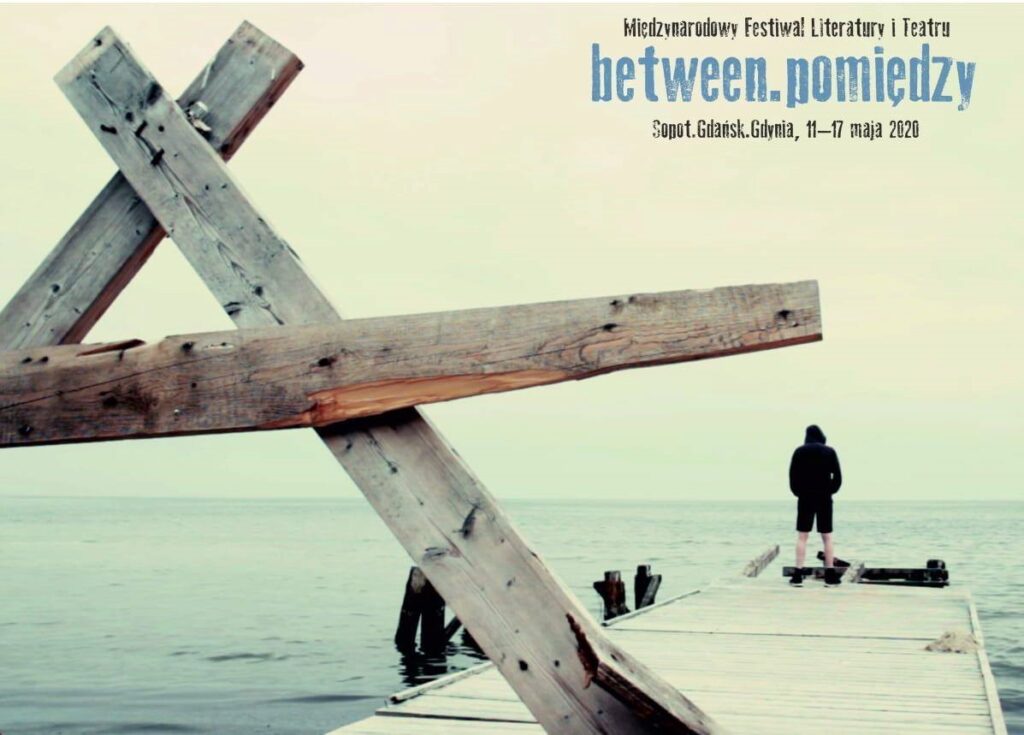
Poster of the 2020 Between.Pomiędzy Festival.
Octavian Saiu: I think everything you’ve said, David, really relates to the point, the essence of these “betweenness,” that captures everything about the festival called… “Between.” It is between the local and the global; it is between the real and the virtual. It cannot be fully virtual, because there is this actuality of what is going to happen, that everything will be based on and everything will be depending on. I think everything, everything in this event is liminal, is not definite, is not this or that, it is between this and that. And such a dimension contributes to the excitement of participating in it. With this in mind, I would like to ask each of you, at the end of this very dialogue, to just say something to that potential viewer of the online version of “Between.” It can be an invitation, it can be a question, it can be a request, it can be a simple quote or gesture. Anything that you find most accurate as a representation of how you feel and how you think about it. Each of you, starting, obviously, with Tomasz, who is supposed to set the tone.
Tomasz Wiśniewski: I may only ask you to keep fingers crossed for us because I think that at this stage, we’re really opening a new adventure, a land that we don’t know and it’s also scary. It’s something that needs to have hope will be possible as an event in the shape that is in our minds. Keep your fingers crossed.
Octavian Saiu: Katarzyna?
Katarzyna Kręglewska: This is the question that I ask myself and the question is: “How to preserve liveness as the essence of the theatre and of our festival as well, how to preserve it while working virtually online?” This is my question.
Octavian Saiu: Hopefully we will find an answer, one that will probably invite more questions. David?
David Malcolm: Well, in fact, Kasia, the liveness is in a sense there, because, as Tomek says, we have no bloody idea how it is going to go on and how this is going to work and how it is going to develop. I’m proud to be associated with these two, younger persons (laughs) who are brave enough to do this. I don’t think I would have touched it with a barge pole. I’m from planet 1950s, so I’m not sure if I could have done this. I am absolutely fascinated and excited about the possibilities here. The other thing I would say is that if these events – and I use the word events, encounters, items, occurrences – if they are in virtual form, we can actually, I think legitimately, ask people: “Just try this.” It doesn’t actually involve a huge commitment like going out on a chilly night, buying tickets, sitting in a hall with lots of people. And the great opportunity of this is that people may finally . . . . Tomek, Katarzyna, and I have always said that education is an essential part of the festival and our operations as a foundation. Now we can’t do much education, strictly speaking, in this virtual world, but, of course, we can invite people in, and they can test things: “No, no, we don’t like that! Oh my goodness, that is absolutely fascinating! I must get more of this, let’s join in! Next time we actually get into the theatre or into a classroom, into a space.”
Octavian Saiu: I really echo David’s definition of this leisurely, relaxed feeling, entailed by the experience of an online festival. It really counterbalances the commitment that is necessary in order to participate in such an event. And I’d like to thank you for allowing me to be a part of this dialogue and of this wonderful, cultural dream of yours. The dreams that we dream together are the powerful ones: I think it is what really should be the underlying message of our dialogue. In the end, I would like to add something very brief, a thought that I borrow from the great Oscar Wilde. It happens to be my favourite quote from all world literature, and I think these days, during this crisis, it really strikes a chord with everybody who understands the meaning of culture. I’m sure you will recognize it, and in fact, I think that David might have already guessed which one it is.
David Malcolm: No! I haven’t. My mind is running right now.
Octavian Saiu: “We are all in the gutter, but some of us are looking at the stars!” We need to keep looking at the stars because it will enable others to do the same.” So let’s look at the stars during the “Between” festival, and let’s hope that more people will join us. Thank you so much, Tomasz, Katarzyna, and David for this wonderful dialogue, which I’m sure will inspire people to engage with “Between” this year.
Transcription by: Natalia Szczepańska, Monika Lenkiewicz and Bartłomiej Pastuszka.
This post was written by the author in their personal capacity.The opinions expressed in this article are the author’s own and do not reflect the view of The Theatre Times, their staff or collaborators.
This post was written by Between. Pomiędzy.
The views expressed here belong to the author and do not necessarily reflect our views and opinions.

